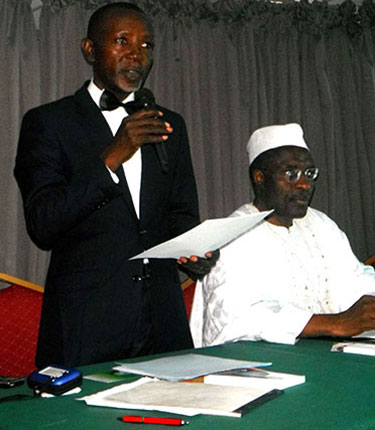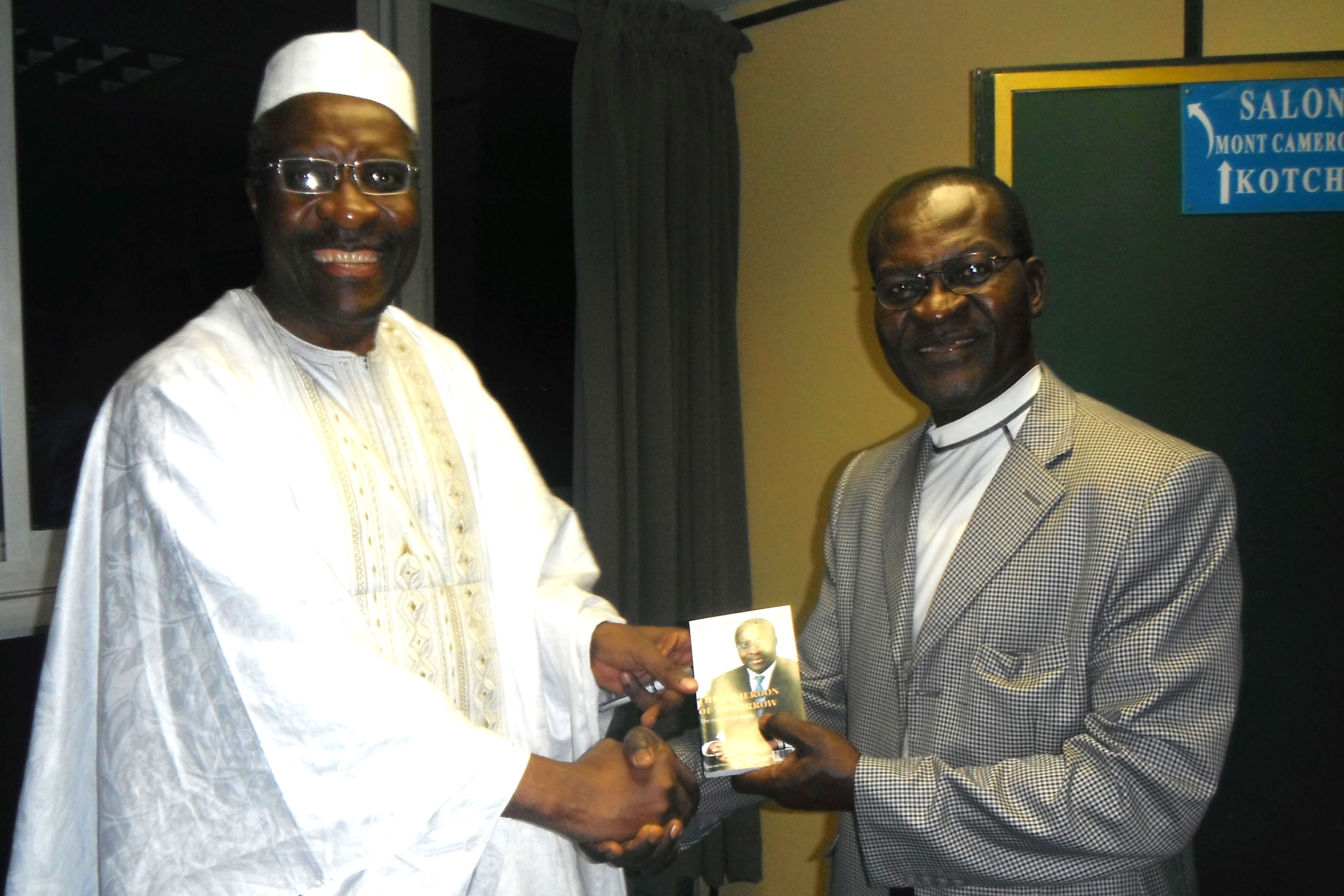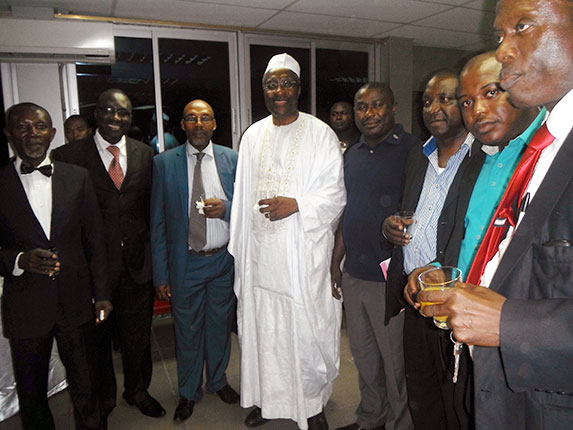Dr. Christopher Fomunyoh: President of Cameroon ?
Dr. Christopher Fomunyoh, Regional Director at the Washington based National Democratic Institute, NDI and President of the Fomunyoh Foundation, was presented by the Cameroonian media as a serious challenger to incumbent President Paul Biya for the 2011 presidential elections. But he ended up not declaring his candidature. This speculation has again resurfaced; this time around in the form of a book "THE CAMEROON OF TOMORROW"
The strong positions Dr. Christopher Fomunyoh has been taking on the undemocratic practices in Cameroon and human rights violations perpetrated by the ruling regime and his experience in election monitoring singled him out as the one person who could emerge as consensus candidate for the opposition at the time.
His consultation in Cameroon with political forces during his sabbatical in the run-up to the 2011 presidential were interpreted as lobbying to be single candidate, but that was not to be.
At a time when the debate is already revolving around President Biya's succession in Cameroon, the name of this fine expert has again cropped up in the form of a book.
In his book titled "Dr. Christopher Fomunyoh - THE CAMEROON OF TOMORROW; The Man in his words", Mokun Njouny Nelson, a practicing journalist, apparently presents the manifesto of an ideal candidate standing an election, which in all intents and purposes refers to Dr. Christopher Fomunyoh who has not yet declared for any party, nor created one.
The book which was launched in Douala, Cameroon's economic capital on Saturday September 13, 2014, does not state clearly whether Dr. Fomunyoh is nursing presidential ambitions. Answering a question to this jigsaw during the launch, he was categorical; > "With the experience and expertise that I have gathered over the years, I will not spare any time and effort to be part of the efforts of the Cameroonian people towards a more democratic and economically viable Cameroon."
The book also espouses the views of Christopher Fomunyoh on the Anglophone problem, the Biya regime, elections, the rule of law and democracy. It paints the portrait of an ideal presidential candidate and suggests ten points on which the opposition in Cameroon can work to attract national and international appeal and visibility.
The book THE CAMEROON OF TOMORROW is bilingual in English and French.
Nwan Tangwi
READ FOREWORD BY PROF. TAZOACHA ASONGANYI BELOW
This is a book about Dr. Christopher Fomunyoh, a well-known name in Africa on the issues of democracy, and democratic elections. He is sometimes described as « Mr. Africa » of democracy and free and fair elections. Although he is an expert and authority on democracy in Africa, he does not impose his ideas on other people; he espouses respectful communication even among disagreeing parties to reach consensus and compromise. This is a great strength of leadership because leaders have to build consensus around their convictions and reconcile them with the personal convictions of others. He is always aware that it is such "balance" among disagreeing parties - factions - that gives democracy its built-in self-control.
Dr. Fomunyoh has watched events unfold in Cameroon from his privileged position at the Washington DC-based National Democratic Institute, NDI. He has had the foresight to imagine the best future for Cameroon and point the way to it,
as so aptly summarized in this little book about him.
He has not only pointed the way to the future, he has tried to imagine how we can get there - reason for his interest in visionary leadership, and « a fresh face untainted by the fatigue and scandals of the ruling party or fragmented politics of the opposition».
Consequently, in the build-up to the 2004 presidential election, Dr. Fomunyoh's name was mentioned as a possible candidate; the same was true for the 2011 presidential election. He confirmed himself that he was « determined to stand side by side with [his] fellow compatriots come this October (2011). » However, the absence of a level playing field dissuaded him from being one of dozens of candidates that finally participated and lost woefully to the incumbent Paul Biya who had undemocratically prepared the ground for his own victory.

In all that he has written and said, Dr. Fomunyoh has been making considerable effort to furnish the glue to hold people together, and the imagination around which people can mobilize to bring change to our society. He is always aware that the change we all dream of is too complicated, too multifaceted - too human - to be arranged in linear logic from cause to effect. The seed of change is in all of us; for the seed to sprout, it needs just a change of attitude by those who have failed us before; just the casting away of their selfish attitudes; just their coming together to make something different, something that has not happened before, happen. The type of future we are all dreaming of is neither a straight line projection of the past, nor the present; there can be a better outcome than would be got by adding up past experiences; the past is just prologue, not a forecast. Those who are leaders of big, medium and small parties, as they are usually described in the divisive opposition ranks had better pay attention to this vision of Dr. Fomunyoh.
In politics it is impossible to acquire a mastery over ends, over the choice of the means to achieve the ends, and even over one's own self. Politics cannot be redefined simply by an act of will that anyone can undertake at any time; The perceptions that guided the plebiscite that was conducted in British Southern Cameroons on February 11, 1961 should be viewed within this perspective. By the time Southern Cameroons went to
the polls for the plebiscite, the longest Dr. Emmanuel Endeley lasted as Premier was three years; the longest John Ngu Foncha had lasted was three years. At that
time, it was unimaginable that the democracy we sought would allow Ahmadou Ahidjo to remain president for 23 years; and his successor would last for 30 years or more! It was also unimaginable that there could be a one-party state. It was unimaginable that the country's name, "Republic of Cameroon" which Southern Cameroons united/reunited with, would be brought back years later to represent the name of the united country. In a way, following the plebiscite, there was a one-sided affirmation by nationalists of the "Republic of Cameroun" - the denial of the need to preserve the political place that had to make society's self-interrogation and self-critique possible.

In each society, the distinction between the political and politics creates the space in which democracy becomes possible. The political is the way in which a society and its members come to understand themselves; it is the process by which a society expresses its autonomy, giving itself its own laws; it is the condition of the possibility of politics.
The political binds the citizens into an autonomous community that endures, evolves over time, and generates responses to new challenges. The generation of such responses could involve processes that lead to successive radicalization of reflection on who citizens or a subset of citizens are and what kind of society they want. It could also involve a series of particular resistances usually transformed from a stubborn negation of arbitrariness into a normative political affirmation of a solidarity for which no sacrifice was too great. This can be said to be the present state of the Anglophone in Cameroon today. This changing political nature and the closing of the public space in which self- interrogation and self-critique of society had to occur brought with them new questions and new challenges.

It is usually odds that prop up on the road of human evolution that define the human spirit. The human spirit is very powerful, indomitable, and is capable of achieving any aim it sets itself. This is why in human history new beginnings are always possible. New beginnings are possible because political action in society is usually divided into periods, described as "lived experience," "reflection" on lived experience, and "conception" of new action or new beginnings. The "new" action always constitutes the first stage of the next political "period." Ahidjo may have messed up the unification agenda; his turpitudes may have been legitimized/legalized with the problematic and provocative change of name of Cameroon back to "Republic of Cameroon" using law N° 84-1 of February 4, 1984.
These are all issues in the public place that need to be addressed, barring the regular abuse of the human rights of SCNC militants who advocate secession, following Paul Biya's secessionist law N°84-1.
Dr. Fomunyoh is right to state that: "Ironically those that govern Cameroon today seem to think that turning a blind eye or using tough-fisted tactics would resolve the grievances of Anglophones. They should think again and especially note that tensions have been exacerbated with each passing year... I am looking forward to a day when there would be a genuine discussion on how to resolve the Anglophone problem in a way that can make each and every Cameroonian feel part and parcel of this country..." He advises that Anglophones should know that in Cameroon, they have the "right to have the cake and the knife and decide the distribution..."
Of course, this can only become possible if the space between the political and politics in which democracy becomes possible returns to our democratic landscape, giving birth to conditions for the organization of truly free and fair elections in
Cameroon. This little book "The Cameroon of Tomorrow" is testimony to the fact that Dr. Christopher Fomunyoh is doing everything to use all the experience he has gathered on elections and democracy over the past decades, to make this happen in Cameroon.
Yaounde, September 20, 2012.
Prof. Tazoacha Asonganyi
Faculty of Medical & Health Sciences,
University of Yaounde I
Former Secretary-General of the Social Democratic Front (SDF).
|

